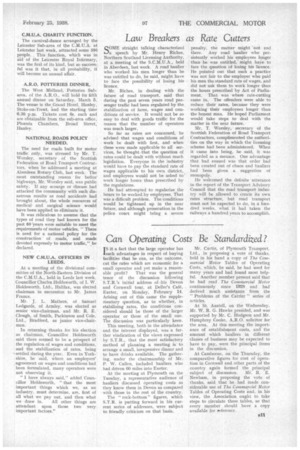Law Breakers as Rate Cutters
Page 45

If you've noticed an error in this article please click here to report it so we can fix it.
ROME straight talking characterized sJa speech by Mr. Henry Riches, Northern Scotland Licensing Authority, at a meeting of the S.C.M.U.A., held in Aberdeen, last week. A road haulier who worked his men longer than he was entitled to do, be said, might have to face the possibility of losing his licence.
Mr. Riches, in dealing with the future of road transport, said that during the past seven years road passenger traffic had been regulated by the. stabilization of fares, wages and conditions of service. It would not be so easy to deal with goods traffic for the reason that the number of operators was much larger.
So far as rates are concerned, he advised that wages and conditions of work be dealt with first, and when these were made applicable to all services, he thought that the question of rates could be dealt with without much legislation. Everyone in the industry would have to pay the standard rate of wages applicable to his own district, and employees would not be asked to' work longer hours than prescribed by the regulations.
He had attempted to regularize the hours to be worked.by employees. That was a difficult problem. The conditions would be tightened up in the near future, and although prosecution in the police court might bring a severe
penalty', the mattermight not end there. Any road haulier who persistently worked his employees longer than he. was entitled, might have. to face the question of losing his licence. He pointed out that such a practice was not fair to the-employer who paid his men the standard rate of wages, and did not ask them to work longer than the hours prescribed by Act of Parliament. That was where rate-cutting came in. The offenders were able to reduce their rates, because they were working their employees longer than the honest man. He hoped Parliament would take steps to deal with the matter in the near future.
Mr. T. Worsley, secretary of the Scottish Federation of Road Transport Contractors, complimented the authorities on the way in which the licensing scheme had been administered. When it came into being, he said, it was regarded as a menace. One advantage that had ensued was that order had been created out of chaos and hauliers had been given a suggestion of monopoly.
He welcomed the definite utterance in the report of the Transport Advisory Council that the road transport industry will be allowed to create its own rates structure, but road transport must not be expected to do, in a hundred weeks, what it had taken the railways a hundred years to accomplish.
































































































